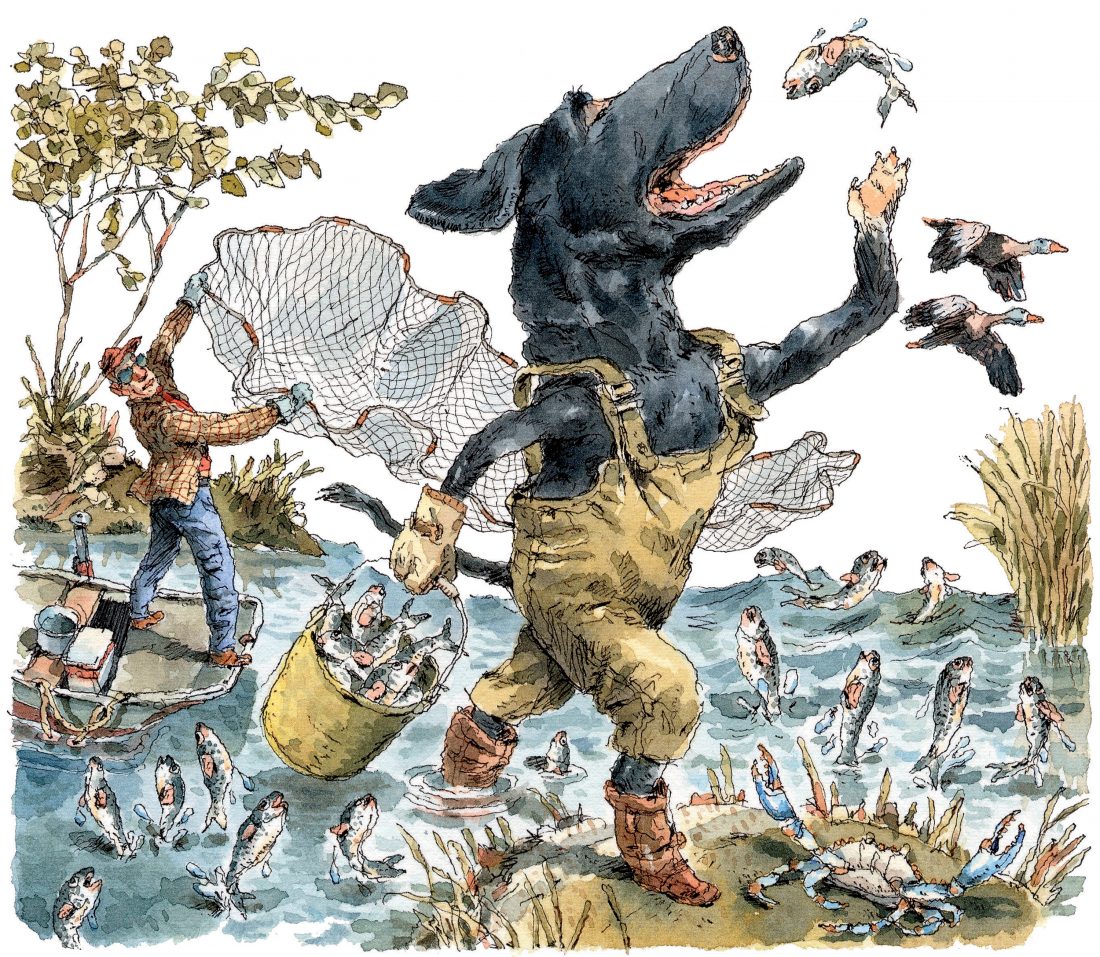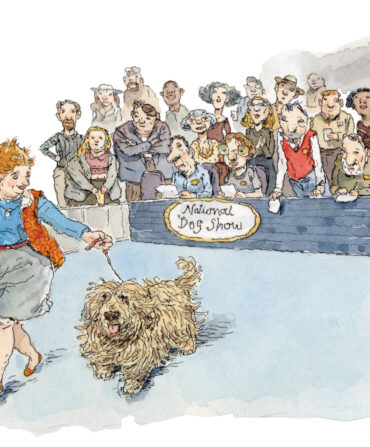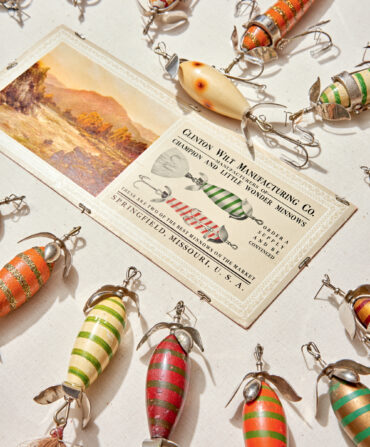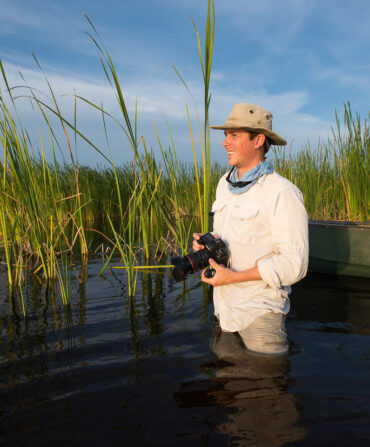When I walked out to the garage in the morning, nothing happened. No birds swooped by, no mist rose from the yard. The live oak to my right didn’t cast any shadows, and the air was neither warm nor cold. Our King Charles spaniel, Charlie, seemed to notice the same. He lifted his nose in the air and paused, trotted past a couple of buckets, and even ducked into the dirty old dog crate with its saggy bed covered in clumps of coarse black hair. Then we both turned back toward the house, dodging a couple of large-dog land mines. In the silent yard by the grill, the dying lantana, the pampas grass, fig tree, and fallow garden—there was an absolute nothing.
Gauge showed up on May 17, 1998—my twenty-second birthday and the day I graduated from Davidson College. The girl I dated in high school and semidated through college surprised me with an already-named, licking, needle-toothed fuzz ball that squirmed like a baby gator in my polyester gown. That summer, old girl and I took the little black Lab to my fishing shack on an Oak Island, North Carolina, creek, and we lived every day with him as puppies might. We fished, we ate from the marsh, we fussed at each other, and we danced around on the deck of a skiff, covered in salt and heat while the goofy young Lab sprinted and stumbled up and down long sandbars. At night, he trembled in our arms as the Southport fireworks show bloomed and thumped over Battery Island.
He was a fishing dog, and one of the first things I taught him that July was to tow a yellow minnow bucket in his mouth through the shallows while I threw the cast net for mullet. He ate every minnow I couldn’t grab—and put on a summer sheen that drew all kinds of compliments. He was lip-hooked more than once with flounder rigs, oyster-cut so much that red paw prints dotted the dock, walkways, and floor for years. He bailed out of the pickup bed twice and lapped up whole Fry Daddies full of fish grease multiple times. And he wowed onlookers as he filled out and grew—sleek and long, blocky and rippled like a panther with those light-colored eyes that might’ve belonged to a Chesapeake.
A hunting dog too, by default, Gauge sat on the cold floor of a jon boat in a lost pocket of the Waccamaw River at eight months old. He looked at me and at the unfolding pink sky as wood ducks crossed and squealed above us. I wanted him to do right for my buddies, but all he’d ever seen were sticks and tennis balls. A pair of mottled ducks chuckled and worked at shooting light, and we knocked one down. Gauge bailed overboard, swam to the duck, walked up in the saw grass, and circled the dead brown bird, looking back over his shoulder at me hollering “Dead bird! Bring it here!” He did, and did the same on a few woodies and teal, and I was filled with relief.
In February old girl left for a semester in the Caribbean. Gauge and I stayed in the shack on the creek, froze our asses off when the wind blew through cracks in the pine floor, and when it became apparent that old girl wasn’t coming home (like, ever), we drowned our sorrows in fish and duck adventures up and down every discoverable haunt on the East Coast and the Mississippi Flyway.
One Friday evening I let Gauge out into the yard and jumped in the shower, intending to head up to a livelier spot north of Oak Island and most likely in a rush. When I walked out to call him in, he was gone. I widened the radius, hollering and whistling until I couldn’t see down the roads. I drove with the windows down, hoping to see his eyes glowing in the headlights. One of my buddies, Scooter, who’d grown pretty attached to Gauge, came over with a twelve-pack of Busch Light and helped me make the rounds. After several hours, we reconvened on my couch. I was a panicked wreck. Scooter was drunk and hopeful, somewhere between heroic and annoying. I woke every hour and checked the porch only to see a full food bowl and an empty dog bed.
Right at daybreak, about the moment when ducks move before legal light, I snapped off the couch from a bad dream and looked around. Total silence. I scrambled to the porch door. Saw Gauge Man on his bed, sound asleep. Stared. Looked around again, buzzing with exhaustion and delirium. Looked back at my dog—slick pawed and skinned up around his nose and chin—and realized it was real. He’d run a long way back from somewhere, and he was home, and so I piled onto the old dog bed with him and buried my face in his fur and suddenly recognized all the spaces he filled.
Years later, in Charleston, South Carolina, my wife, Jeni, called him Big Stinky Head, and she seemed to have the kind of crush on Gauge that a girl might have on a handsome older actor—Sean Connery or someone. She never saw him hunt, never witnessed the hero stuff: the white frozen fur on Contentnea Creek, blind retrieves on the Pamlico Sound, thunder snowstorm wigeon and gadwalls at Reelfoot Lake. But Jeni didn’t need to see the glory moments. Even though he’d lived with other women, slept in more towns than a homeless gypsy, and started his life in a world long ago and far away—she loved the hell out of him.
He was nowhere near perfect, in the blind or the house. He sometimes broke on gunshots, clearly liked to wander, and was grumpy around his food bowl—which never bothered our knuckleheaded King Charles, who always endured the growling to steal a few pieces. Gauge mellowed some as he got older, but I wondered if he’d be okay around a child once we decided to embark on that journey. Jeni and I talked about kids and names in the early winter of 2010, nigh on ready to bring a little one into the world.
That November I tried to make myself hunt him a few times, but his hips and feet and neck muscles and eyesight and ears had all begun to fail. He picked up three wood ducks in a creek off the North Santee, and it took him a long time to recover.
In the spring, Jeni and I celebrated the new life growing between us. Both dogs probably recognized that life had changed forever as the hard summer came on. Gauge wandered off again for a whole night, fortunately showing up the next morning on a nice lady’s porch a few miles away. His gait slowed more, and he struggled to get off his bed.
Hunter William was born in October on the full moon, and the world was altered on its axis. I let Gauge sniff him when we came home. He lifted his head and looked at me, then wandered back to the garage. Before long, we were gone again, celebrating our little dude at Thanksgiving with the family a couple of hours up the coast. Life was round and warm and delicate, full of food and fires, the absolute best of times. I was trout fishing with my father-in-law, and the trout were snapping when the dog sitter called.
I hooked my plug to the rod before picking up, knowing enough before being told. He wouldn’t get up, she told me—had even chased the tennis ball a few times before resting on the deck. But now he wouldn’t get up. I called my dad, and he stayed positive, holding the fort until I got home. Running the boat across the inlet, I felt streaks of wind get colder between my eyes and ears.
My last moments with Gauge were simply his and mine. They were sloppy and serene and gut wrenching, elegant and ugly and suddenly over. It’s a time that we all have in empathetic common with one another, mine no more or less tragic than yours. Afterward, I picked up his ashes and drove them toward my Oak Island shack, smiling at things that made more sense the farther I traveled.
I thought about how a dog can make the balance of life more intense, fuller, rife with youthful energy and goofy moments that you’d never admit. I realized, too, that Gauge had hung on to overlap Hunter, and that he’d done so for me. He bridged the gap for a long time as the single constant in a journey through the arrival and departure of places and people. I thought about the overlapping circles of life—family, groups of friends, communities that carry us along and pass us to the next—and about how the memories within those circles are the things we value most when the sun finally sets.
I launched the jon boat at Oak Island and took Gauge’s ashes to every good hole—flounder structure behind Fort Caswell, trout rips in the river, grass banks where we’d picked up a drake wigeon one afternoon. That evening, on the deck of the shack, I sent the rest of him into the creek and chucked his tennis ball across the marsh one more time. Then I made myself sit at the kitchen window and look at the marsh and scratch a note to my newborn son.
Dear Hunter,
Tonight, I smiled—even though my smile fought its way through salty tears that rolled into my beard like pieces of the ocean. My old buddy Gauge, a big strong black Labrador retriever dog, went to heaven early this morning because he was old and it was his time to rest. Your dad and Gauge had so many adventures together, in lakes and rivers all over the land. We would listen to the ducks in the early light, pulling the air against their feathers so fast it whistled. And for 13 moons in November, Gauge and I roamed and hunted and waited for the day when you would join us, and now you’re here, and Gauge has passed his spirit to you.
Love, Dad








